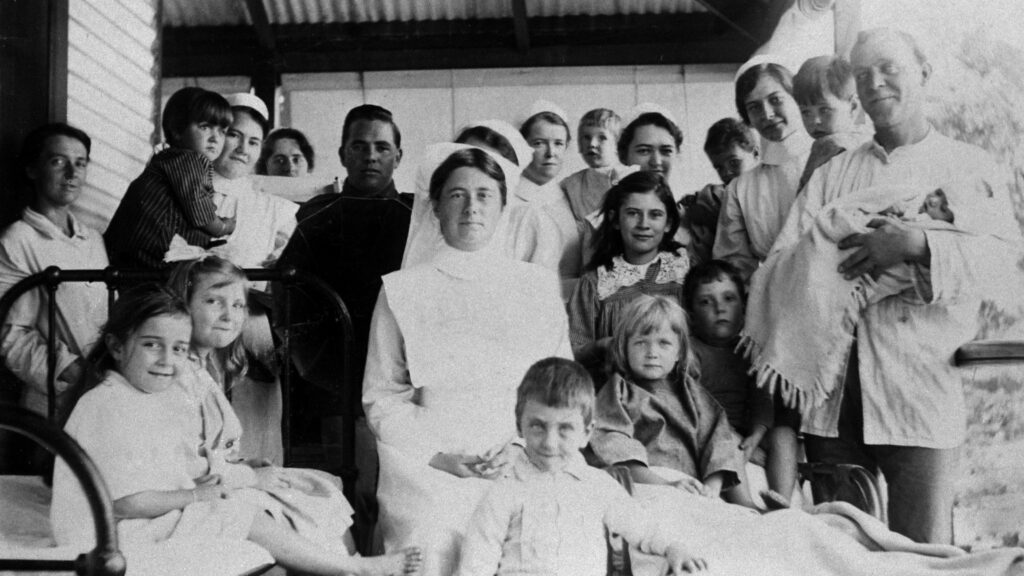Consumers and community
RPH museum Tour – (Boorloo Festival) sharing our medical heritage
It is a privilege to introduce new generations of Western Australians to our rich medical history.
In April 2024, the Royal Perth Hospital (RPH) Museum took part in the Lotterywest Boorloo Heritage Festival, a City of Perth event which shines a light on the city’s built, natural and cultural heritage.
Over 2 days, 360 visitors were able to learn about the history of RPH, our medical trailblazers and the practises, equipment and instruments used by previous generations of health workers.
These included anaesthetic and surgical instruments hand-built by pioneer anaesthetists at the forefront of pain medicine, and rare 1930’s footage of an intubation procedure.
A special tactile tour allowed for blind and vision impaired people in the community to discover objects by touch.
Respected Clinical Microbiologist Dr James Flexman, gave a talk about the history of RPH and its predecessors, such as Colonial Hospital, in managing outbreaks of diseases dating back to 1830.
The events were held on the weekend of April 6 and 7 and were free of charge to the community.
It is the fourth year the museum has been part of the Boorloo calendar.



Partnering with our community
Engaging and partnering with consumers and our community remains key to achieving our vision of healthy people, amazing care.
Improving the consumer experience
In 2023-24, EMHS completed a number of actions in support of the commitment to our community:
- EMHS is required to submit annual complaints data to the independent Health and Disability Services Complaints Office (HaDSCO), for publishing in the HaDSCO annual report.
In 2023-24, EMHS had very few complaints classified as grievances, which provides assurance that our complaints handling and management practices are sound, empathic and person centred. HaDSCO have commended EMHS on our commitment to quality and compassionate responses to concerns. - The EMHS Multicultural Advisory Group continues to meet to support the implementation of the EMHS Multicultural Plan (click here for more information). The group engage and consult on many initiatives across EMHS including the review of policies that may impact Culturally and Linguistically Diverse (CaLD) people, ensuring that the needs of our CaLD community are appropriately embedded within policy.
- Dementia Australia have formally acknowledged the ongoing commitment of EMHS towards becoming dementia friendly.
Through a raft of initiatives, EMHS continues to engage with people living with dementia and their carers, to better understand the healthcare experience. EMHS are proactive in raising awareness about dementia, conducting dementia delirium study days and participating in Dementia Action Week, and continues to increase the number of Dementia Change Champions who provide expertise and support to clinical staff caring for patients with dementia and delirium.
Armadale Health Service (AHS) and Kalamunda Hospital (KH) have introduced a number of local quality improvement programs to enhance the experience for their local catchment, including:
- ‘Kaya (hello), my name is …’ campaign; to forge positive interactions from first contact and remind staff to greet consumers by introducing themselves by name.
- #everyweekcounts; a global first, national collaborative to ensure as many women as possible birth safely at 39 weeks or later with improved outcomes for both mother and baby (click here for more information).
- Engagement with the City of Kalamunda to promote the availability of local, person centred, contemporary palliative care services. Community activities included a lantern lighting to recognise the importance of compassionate palliative care services.
Various initiatives were undertaken to improve the consumer experience in the Emergency Department (ED), including:
- expansion of the ED triage and waiting room area to create more space
- implementation of a smart queue system, ensuring patients are seen in order of presentation and no one is missed
- introduction of a screened-off area in the waiting room to improve privacy for taking observations
- provision of tea and coffee during extremely busy periods with long wait times
- placement of volunteers to offer support, explain the process of triage, keep the waiting room tidy and assist visitors.
Royal Perth Hospital (RPH) and Bentley Health Service (BHS) have introduced many local quality improvement initiatives to enhance consumer services for their local catchment, including:
- Volunteer Meet and Greet Program to help patients settle into their new surroundings. A 3-month pilot of the program is underway on Wards 6H and 8A at RPH. Volunteers offer a friendly point of contact for all the small things that make a big difference; such as setting up the TV, a magazine or newspaper, or having a comforting chat.
- The Lived Experience Advisory Group continues to visit people across RPH and BHS as part of consumer rounding, to identify opportunities for improvement.
- Patient Engaged Handover Project which helps to capture patient and carer goals and their understanding of the care being provided.
- Bush Tucker Lunch, hosted on a 3-monthly basis, where inpatients are invited to the Aboriginal Garden for lunch and a yarn (click here for more information).
- Various activities in support and recognition of significant dates. These included Patient Experience Week, Carers Week, Mental Health Week, Dementia Action Week and International Day of People with Disability. A highlight included a wheelchair basketball session with the Western Australian Institute of Sport and the Fremantle Dockers.


Giving consumers a voice
Consumers provide valuable feedback and contribute to improving the safety and quality of services. EMHS provides a number of opportunities for consumers to provide feedback on EMHS’ health care services.
The use of the Australian Commission on Safety and Quality in Health Care’s Australian Hospital Patient Experience Question Set (AHPEQS) across EMHS hospitals provides validated, standardised patient experience questions by way of an SMS based survey to consumers following discharge or leaving hospital.
EMHS AHPEQS results for 2023-24
| AHPEQS question | Response |
| My views and concerns were listened to | 92.82% |
| My individual needs were met | 92.25% |
| I felt cared for | 93.15% |
| I was involved as much as I wanted in making decisions about my treatment and care | 89.80% |
| I was kept informed as much as I wanted about my treatment and care | 89.98% |
| As far as I could tell the staff involved in my care communicated with each other about my treatment | 85.62% |
| I received pain relief that met my needs | 92.36% |
| When I was in the hospital I felt confident in the safety of my treatment and care | 91.68% |
| Overall the quality of the treatment and care I received was very good | 93.00% |
The Net Promotor Score (NPS) is the percentage of patients who rate their likelihood to recommend our service to a friend or colleague as 9 or 10, minus the percentage who rate 6 or below on a scale of 0 to 10. When considering the overall NPS for EMHS, the upper quartile of inter-industry organisations have an NPS of +72 or higher.
EMHS NPS rating for 2023-24

Compliments and complaints
EMHS continues to subscribe to the use of Care Opinion, an independently controlled, online platform enabling the public to provide feedback about their experience with our services. Feedback is used to improve services and recognise staff and teams who go above and beyond our consumer/carers’ expectations.
In 2023-24, EMHS received:

- 2,827 compliments via formal feedback processes
- 38 entirely complimentary stories via Care Opinion
While this recognises only compliments provided through a formal mechanism, it should be acknowledged that there are a multitude of compliments and thanks fed back to staff informally and directly by patients, carers and their loved ones.
EMHS also received:

- 938 complaints via formal feedback processes
- 70 complaints via Care Opinion
EMHS manages patient feedback consistent with the WA Health Complaints Management Policy (2020), with all complaints acknowledged, investigated and responded to within appropriate timeframes, and quality improvement activities initiated to address issues where appropriate.
Example of a change arising from patient feedback
Situation
Aboriginal patients and their families identified a gap in culturally safe and secure care within a Mental Health Unit at Armadale Health Service (AHS). Aboriginal Health Liaison Officers (AHLOs), who cover the entire hospital, were not always able to ensure the cultural needs for people accessing mental health services were met in a timely manner, or provide support for culturally safe and secure care at short notice.
Changes implemented as a result
A dedicated Mental Health Aboriginal Health Liaison Officer (MH AHLO) was appointed following a successful recruitment process. The MH AHLO provides support to individual Aboriginal people in the Mental Health Unit, and addresses concerns regarding cultural safety more broadly. They work collaboratively alongside other team members to ensure the best outcome and care for Aboriginal peoples, particularly for those admitted from remote WA communities with specific regional and cultural based needs.
The MH AHLO, as part of the wider AHLO team, leads change across the organisation by supporting and educating mental health staff in the most appropriate and culturally sensitive ways of communicating with Aboriginal peoples and their families. This promotes positive interactions between staff, people accessing mental health services and carers, enhancing the care journey and promoting culturally safe and secure health services.

Examples of stories shared from Care Opinion




Listening to our consumers
Engaging and communicating with patients, families, carers and the wider community is vital to delivering excellent health care.
While the health services we offer are wide-ranging and varied, we recognise the community we serve is also diverse.
In March, about 50 frontline leaders from across Royal Perth Hospital (RPH) and Bentley Health Service (BHS) took part in a special training and education session which focused on patient experience and consumer engagement.
The session, part of an ongoing Frontline Leadership Program, was held at RPH and attended by Royal Perth Bentley Group (RPBG) Executive, Heads of Departments, Nurse Unit Managers and clinical leaders across a variety of disciplines.
It aimed to further enhance our leaders’ appreciation of the value of consumer input on the design and delivery of health care, strategies to engage with consumers and our journey to enrich the ways in which consumers are involved.
Topics covered included sharing decision-making with patients, communicating with family members, skills for family meetings and managing difficult conversations.
Leaders also had the chance to speak with a 3-member panel of consumer representatives covering several areas which included disability advocacy, Aboriginal health and mental health.
The session reflected what we aim to put into practice every day – engaging with patients and the community is not just a strategy, it is at the heart of health care.

Involving consumers in research
A consumer engagement webinar was held on 2 August 2023, with a panel of researchers and consumers providing advice on best practices for involving consumers in the development and implementation of research.
A recording of the webinar is available online with existing research training modules covering grant preparation and competitiveness.

Collaborating to build healthier food environments
EMHS Population Health team is collaborating with researchers on the Food Atlas project to create a web-based interactive map of WA food businesses.
The team has developed tools to assess food menus and the dietary risk of food businesses, with results to feed into the Food Atlas.
Our population health team is also working with mobile food businesses and local government authorities to improve the healthfulness of community events and codesign strategies to improve local food environments, in collaboration with residents in the City of Armadale.


